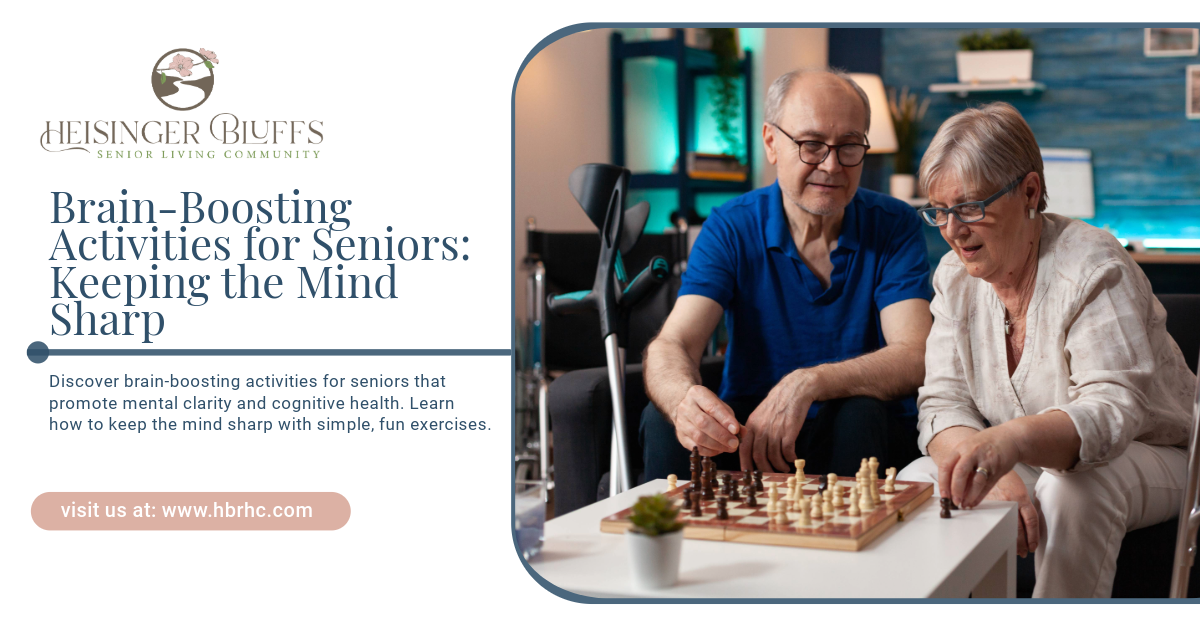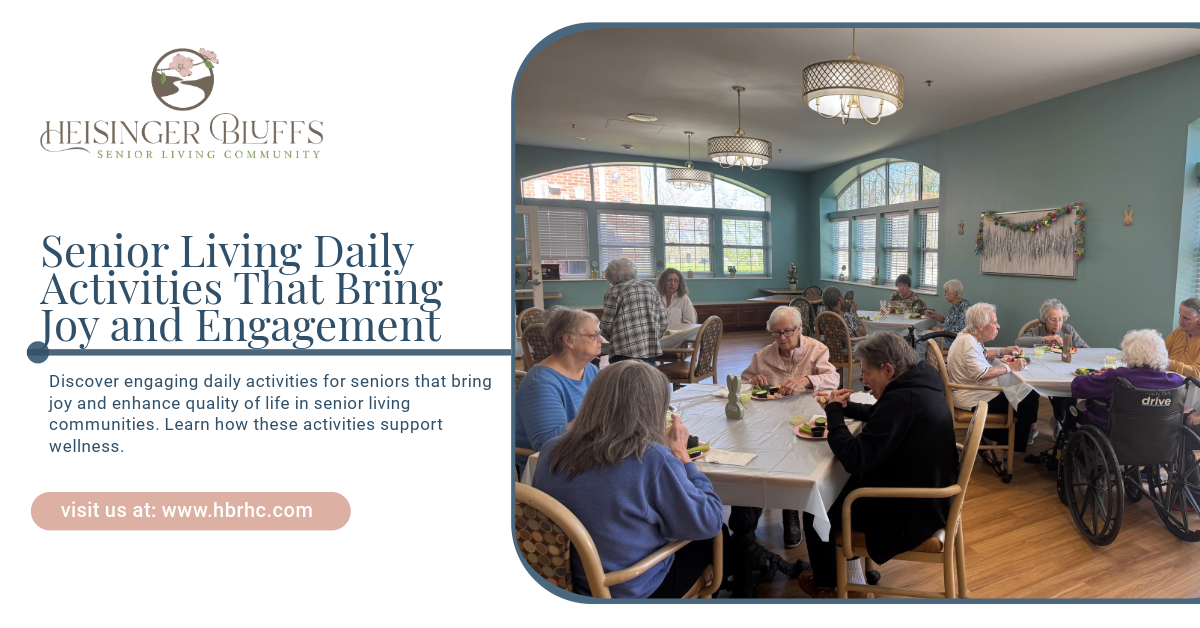Brain-Boosting Activities for Seniors: Keeping the Mind Sharp

As we age, it's essential to keep our minds engaged and active to maintain mental sharpness and promote overall cognitive health. Brain-boosting activities for seniors not only help improve memory and focus but also promote mental well-being and reduce the risk of cognitive decline.
Whether you're looking to challenge yourself with new activities or incorporate simple exercises into your daily routine, there are plenty of ways to keep the brain sharp. In this blog, we’ll explore various brain-boosting activities for seniors in senior living, from puzzles and games to physical exercise and social engagement. These activities are fun, effective, and easy to implement, helping seniors stay mentally sharp for years to come.
The Importance of Keeping the Mind Sharp in Senior Years
As we age, the brain naturally experiences some changes. Cognitive decline, including memory issues and slower processing speeds, is a common part of aging. However, research has shown that engaging in stimulating activities can improve brain function, boost memory, and even delay the onset of dementia or Alzheimer's disease.
Just like physical exercise strengthens the body, mental exercises strengthen the brain. Engaging in brain-boosting activities enhances neural connections and encourages neuroplasticity—the brain's ability to form and reorganize connections in response to learning or experience.
Keeping the brain sharp isn’t just about preventing cognitive decline—it also improves mood, enhances independence, and boosts confidence. Seniors who engage in regular mental stimulation tend to experience greater overall well-being and enjoy a higher quality of life.
Brain-Boosting Activities for Seniors
Now that we understand the benefits of keeping the mind sharp, let's explore some activities that can help seniors stay mentally fit. These activities range from simple games to more complex cognitive exercises.
1. Puzzles and Brain Games
Puzzles are a classic and effective way to keep the mind active. Activities such as jigsaw puzzles, crossword puzzles, and Sudoku can improve memory, enhance problem-solving skills, and boost concentration.
- Jigsaw Puzzles: These puzzles are great for improving spatial reasoning and visual memory. As seniors put together pieces, they engage both their visual and cognitive functions, promoting brain health.
- Crossword Puzzles: Crosswords stimulate word recall and verbal fluency. They are a great way to strengthen vocabulary and keep the brain engaged in critical thinking.
- Sudoku: This number-based puzzle improves logical thinking and memory. It challenges seniors to think strategically and can even improve short-term memory.
2. Reading and Writing
Reading and writing are powerful ways to stimulate the mind. Both activities challenge the brain to process information, form ideas, and enhance language skills.
- Reading: Whether it's books, newspapers, or magazines, reading exercises the brain by improving vocabulary, comprehension, and focus. Seniors can join a book club or participate in group discussions to add a social element to their reading habit.
- Writing: Writing stories, letters, or even journaling can improve cognitive function and memory. Seniors can write about their daily experiences or their personal history, helping them retain memories and share their life story.
3. Learning a New Skill
Learning something new, whether it’s a hobby or a skill, is one of the most effective ways to keep the brain sharp. The brain thrives on novelty, so taking up new activities that require learning can create new neural pathways and improve cognitive function.
- Learn to Play an Instrument: Music has been shown to engage multiple areas of the brain, improving memory and concentration. Seniors can learn to play an instrument, whether it's piano, guitar, or even a new style of music.
- Cooking or Baking: Cooking is an excellent way to engage the mind, especially when learning new recipes or techniques. Baking, in particular, requires following instructions and multitasking, which are great cognitive exercises.
- Art and Crafts: Engaging in creative activities like painting, knitting, or pottery encourages hand-eye coordination, visual-spatial reasoning, and problem-solving. These activities also offer therapeutic benefits, reducing stress and increasing happiness.
4. Memory Exercises
Memory exercises are targeted activities designed specifically to improve recall and strengthen cognitive function. These exercises challenge the brain to retrieve information and make new connections.
- Memory Games: Card matching games or memory recall activities are great for strengthening short-term memory. These games require seniors to remember patterns, names, or shapes.
- Mnemonics: Using memory aids like mnemonics or rhymes can help seniors retain information more easily. They are especially helpful when trying to remember lists or important dates.
- Reminiscing: Sharing past memories with friends or family is a simple yet effective way to keep the mind sharp. Reflecting on meaningful experiences can enhance recall and stimulate positive emotions.
5. Physical Exercise
Physical activity isn't just great for the body—it also supports brain health. Regular exercise improves blood flow to the brain, supports the growth of new brain cells, and enhances cognitive function.
- Walking or Light Jogging: Regular physical activity, such as daily walking, can significantly improve brain health by promoting cardiovascular health, which, in turn, helps deliver oxygen and nutrients to the brain.
- Yoga and Tai Chi: These gentle exercises are known for improving both physical and mental well-being. They promote balance, flexibility, and mindfulness, which can reduce stress and enhance focus.
- Strength Training: Light strength training exercises, like resistance band exercises or weight lifting, have been linked to improved memory and cognitive abilities.
6. Social Engagement and Conversations
Socializing is another powerful way to keep the brain engaged. Having conversations, making new friends, and maintaining social connections help prevent isolation and stimulate cognitive function. Socializing can include anything from chatting with friends over coffee to participating in group activities like board games, trivia, or community events.
- Group Discussions and Debates: Engaging in thought-provoking conversations encourages critical thinking and problem-solving. Seniors can discuss current events, books, or family history, challenging their minds in the process.
- Volunteering: Giving back to the community not only fosters a sense of purpose but also engages the mind by requiring planning, organization, and problem-solving.
The Role of Senior Living Communities in Brain Health
Senior living communities are committed to supporting residents’ cognitive health by offering a variety of brain-boosting activities and programs. From organized exercise sessions and educational classes to social events and recreational activities, these communities provide ample opportunities for residents to stay mentally sharp.
By offering a variety of brain-boosting activities, senior living communities create an environment that fosters mental engagement and promotes overall well-being. These activities help seniors develop new skills, form connections with others, and maintain their independence and vitality.
At Heisinger Bluffs, we understand the importance of brain health and offer a wide range of activities designed to keep the mind sharp. Our residents enjoy a diverse array of events and programs tailored to enhance cognitive function, encourage lifelong learning, and foster meaningful social connections.
Frequently Asked Questions
What are some effective brain-boosting activities for seniors with limited mobility?
Seniors with limited mobility can still engage in brain-boosting activities such as reading, writing, solving puzzles, learning new skills, or participating in virtual games and social conversations.
How can seniors benefit from socializing to keep their brains sharp?
Socializing enhances cognitive function by encouraging mental stimulation, improving memory, and promoting emotional well-being. Engaging in conversations and group activities helps seniors stay mentally alert and connected.
Are there any specific foods that support brain health for seniors?
Yes, brain-boosting foods for seniors include those rich in antioxidants, omega-3 fatty acids, vitamins, and minerals, such as leafy greens, berries, nuts, fish, and whole grains. These foods can help improve cognitive function and protect against memory decline.
Resources:
- https://pmc.ncbi.nlm.nih.gov/articles/PMC4417099/
- https://www.healthline.com/health/mental-health/games-and-puzzles-to-exercise-your-brain
- https://www.alzinfo.org/articles/prevention/reading-and-writing-may-be-good-for-the-brain/
- https://www.cdc.gov/physical-activity/features/boost-brain-health.html
- https://www.health.harvard.edu/blog/3-ways-to-build-brain-boosting-social-connections-202109082585











